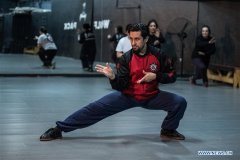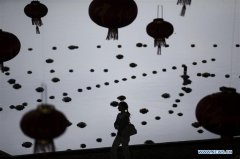Feature: Exploring Chinese cultural elements in New Zealand
WELLINGTON, March 25 (Xinhua) -- Han Xuanting spun in her skirt typical of the style of the Uygur ethnic group in western China's Xinjiang Uygur Autonomous Region, with a dozen New Zealand girls in school dresses imitating her steps around her.
This was a lovely dance class given on Monday noon in Samuel Marsden Collegiate School on the outskirts of Wellington, capital of New Zealand.
For Han, a Chinese dance teacher, this has been her routine. "Children learn very quickly, and they can easily master the skill of twisting their necks while dancing," said Han, referring to a key feature of the Uygur dance.
For Zhang Jianyong, it is busy time every Wednesday evening. As a Tai Chi teacher in Wellington, Zhang taught his students, mainly senior citizens, the moves of this traditional Chinese exercise once a week.
"Many Kiwis chose to take Tai Chi as their daily sports after learning that it benefits their health," Zhang said, adding that this exercise has become a good way of spreading Chinese culture.
Both Han's and Zhang's classes are part of the programs run by the New Zealand Chinese Cultural Center, which has been working to introduce Chinese cultural elements to the local public.
Recently, the center signed a memorandum with Wellington's Whitireia New Zealand to open an optional course of Chinese dance in the government-funded tertiary institute of technology.
The college is also Han's alma mater, where she once performed a traditional Chinese dance for teachers and students before her graduation.
The enthusiasm for Chinese dance has been rising in New Zealand, and Chinese dance is going to be taught along with Western modern dance in this college for the first time.
Guo Zongguang, director of the New Zealand Chinese Cultural Center, told Xinhua that since the center was established more than a year ago, various cooperation forms have been explored, including jointly hosting cultural events and supporting local cultural organizations and Chinese cultural groups.
These events have enriched the cultural lives of New Zealanders and contributed to the local multicultural atmosphere, Guo said.
At the opening ceremony of the Chinese Cultural Week 2016, more than 100 local performers, including the then Wellington mayor, staged a grand show of Tai Chi in the municipal square in the capital.
During the multicultural festival in the New Zealand National Museum, a performance staged by the Chinese Cultural Center was joined by shows of more than 10 ethnic groups in New Zealand, reflecting the multicultural feature of the country.
At the 2017 Wellington Capital Cup, a friendly football match between teams from Wellington and Beijing, cultural performances staged by the Chinese Cultural Center were brought to the football field.
According to Guo, intangible cultural heritage was also brought from China as part of festivity in the celebration of China's Spring Festival in New Zealand, which was also applauded by New Zealand Prime Minister Bill English.
"Such interactions and exchanges have become a window for promoting Chinese culture," Guo said.
"The best and most beautiful things in the world cannot be seen or even touched -- they must be felt with the heart," said Wellington City Councilor Sarah Free, citing blind American author Helen Keller, while attending an intangible cultural heritage exhibition of China's Liaoning province last December.
2016 marked the 400th anniversary of the birth of both Shakespeare and Tang Xianzu, a Chinese playwright of the Ming Dynasty known as the Chinese Shakespeare.
In a global event to commemorate the theater masters, Megan Evans, a lecturer from the Victoria University, said that Shakespeare's well-known line in Hamlet -- "to be, or not to be" -- was reflected in Tang's Peony Pavilion, a play featuring the pursuit of love.
"Such clashes and exchanges of viewpoints are of great significance to cross-cultural communication," Guo said.
Various Chinese cultural events have been introduced to New Zealand to promote the Chinese culture and strengthen the bilateral friendship, Guo added.
Chinese Ambassador to New Zealand Wang Lutong told Xinhua that both the governments and the public have been very active on cultural exchanges, with various cultural forms and schools being introduced to each other.
Zhang has been keen to go beyond his Tai Chi classes. He said that he would promote traditional Chinese medicine and Chinese tea art in New Zealand, so as to enable the people of the Oceanian country to know more about the Chinese culture.















